 Technology peripherals
Technology peripherals
 AI
AI
 Complete data analysis in one sentence, Zhejiang University's new large model data assistant eliminates the need for collection
Complete data analysis in one sentence, Zhejiang University's new large model data assistant eliminates the need for collection
Complete data analysis in one sentence, Zhejiang University's new large model data assistant eliminates the need for collection
To process data, just use this AI tool!
Relying on the large language model (LLM) behind it, you only need to describe the data you want to see in one sentence, and leave the rest to it!
Processing, analysis, and even visualization can all be done easily. You don’t even need to do the collection yourself.
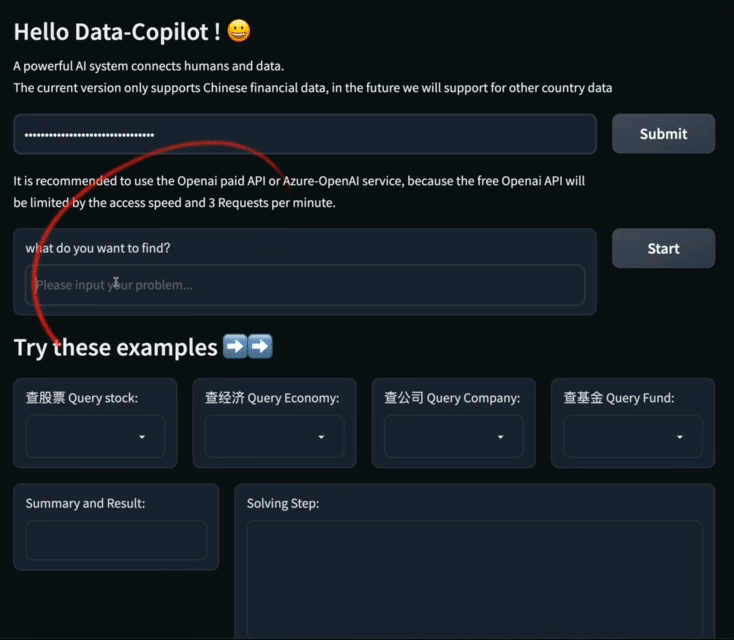 Picture
Picture
This LLM-based AI data assistant is called Data-Copilot and was developed by a team from Zhejiang University.
The preprint of the relevant paper has been released.
The following content is provided by the contributor
Finance, meteorology, energy and other industries generate a large amount of heterogeneous data every day. There is an urgent need for a tool to effectively manage, process and display this data.
DataCopilot autonomously manages and processes massive data by deploying large language models to meet diverse user query, calculation, prediction, visualization and other needs.
You only need to enter text to tell DataCopilot the data you want to see, without tedious operations, No need to write your own code, DataCopilot autonomously transforms the original data into a visualization result that best meets the user's intention.
In order to achieve a universal framework that covers various forms of data-related tasks, the research team proposed Data-Copilot.
This model solves the problems of data leakage risk, poor computing power, and inability to handle complex tasks caused by simply using LLM.
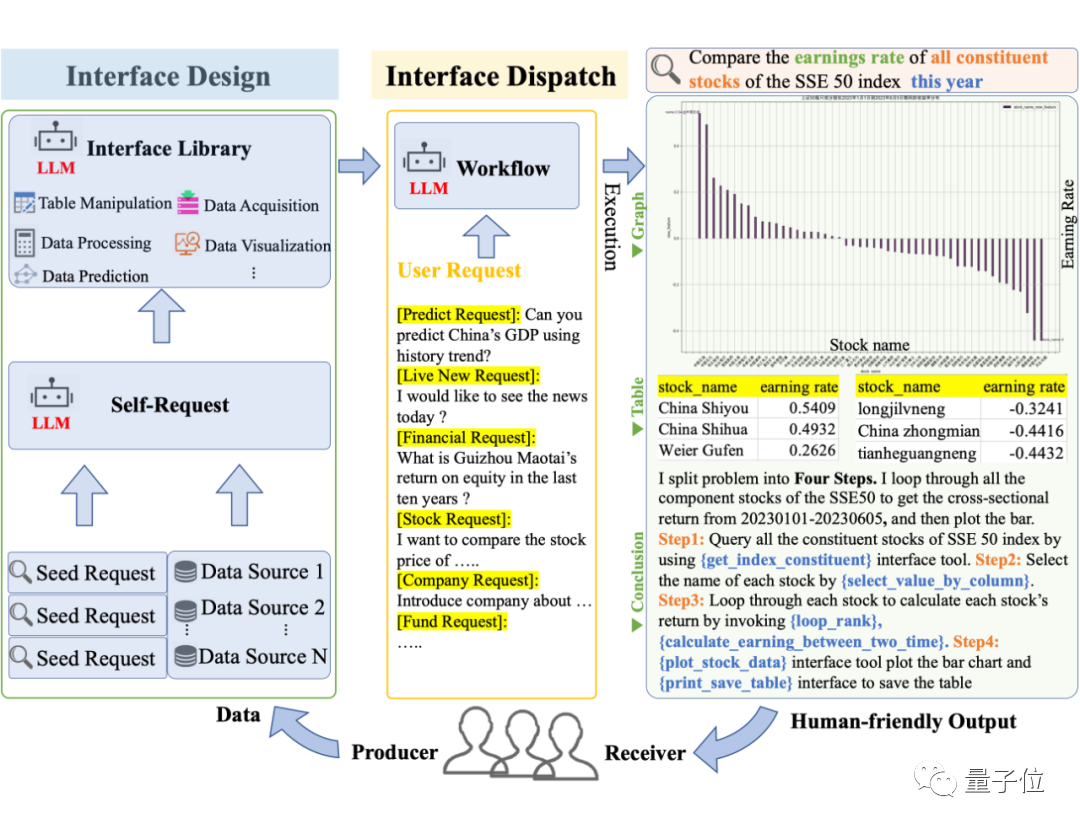 Picture
Picture
When receiving a complex request, Data-Copilot will independently design and schedule an independent interface to build a work process to satisfy user intent.
Without human assistance, it can skillfully transform raw data from different sources and in different formats into humanized output such as graphics, tables and text.
 Picture
Picture
- Connecting data sources and diversification in different fields user needs, reducing tedious labor and professional knowledge.
- Achieves autonomous management, processing, analysis, prediction and visualization of data, and can transform raw data into informative results that best meet user intentions.
- It has the dual
- identities of designer and scheduler, including two processes: the interface tool design process (designer) and Scheduling process (scheduler). Data-Copilot Demo was built based on Chinese financial market data.
- Design and execute the workflow independently
Let’s take the following example to see the performance of Data-Copilot:
All components of the Shanghai Composite 50 Index in the first quarter of this year What is the year-on-year growth rate of the stock’s net profit?
Data-Copilot independently designed such a workflow:
Picture Aimed at this For complex problems, Data-Copilot uses the loop_rank interface to implement multiple loop queries.
Aimed at this For complex problems, Data-Copilot uses the loop_rank interface to implement multiple loop queries.
Data-Copilot got this result after executing this workflow:
The abscissa is the name of each component stock, and the ordinate is the year-on-year growth rate of net profit in the first quarter
Picture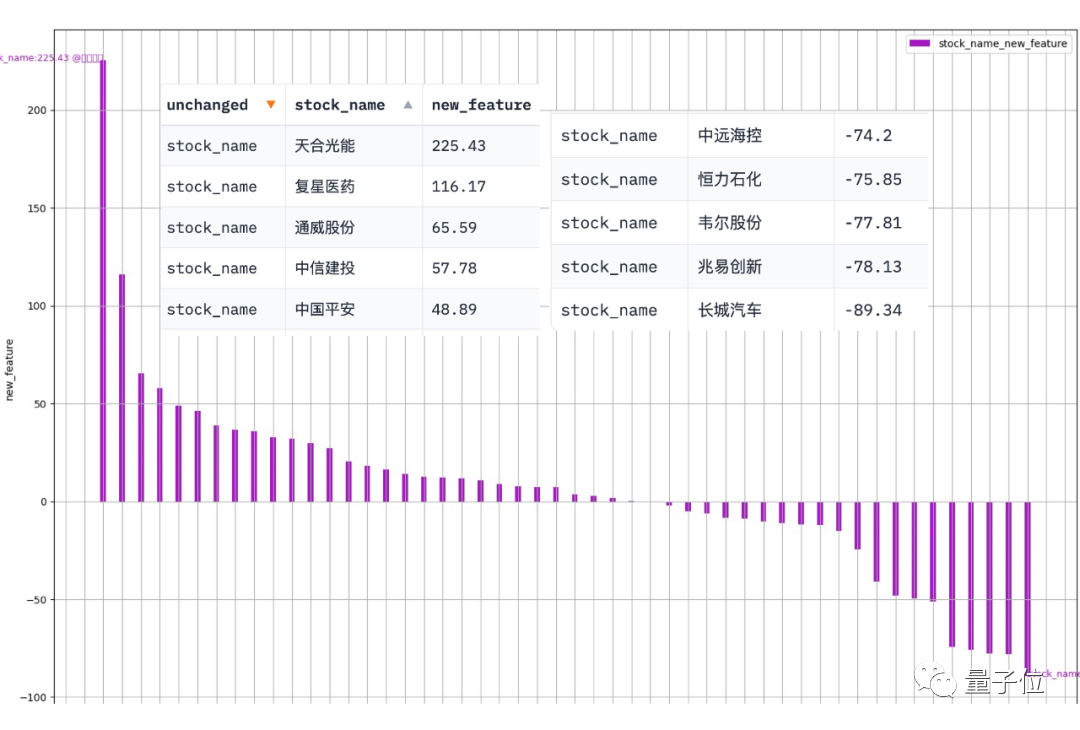 In addition to the general data processing process, Data-Copilot can also generate a wide variety of workflows.
In addition to the general data processing process, Data-Copilot can also generate a wide variety of workflows.
The research team tested Data-Copilot in two workflow modes: predictive and parallel.
Forecasting workflow
For parts other than known data, Data-Copilot can also predict, for example, enter the following question:
Predict the next four quarters China Quarterly GDP
Data-Copilot deploys such a workflow:
Get historical GDP data→Use linear regression model to predict the future→Output table
Picture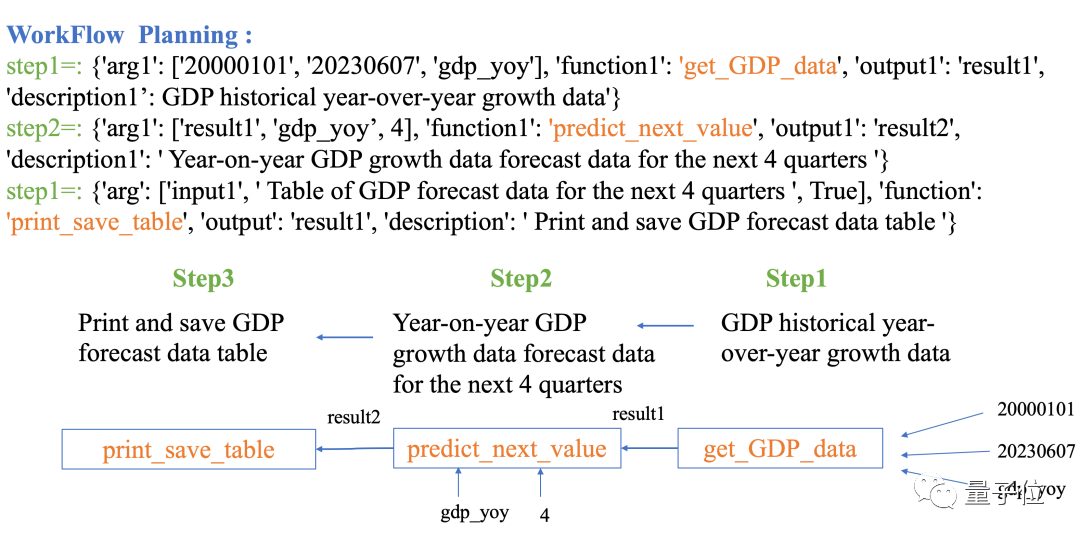 The results after execution are as follows:
The results after execution are as follows:
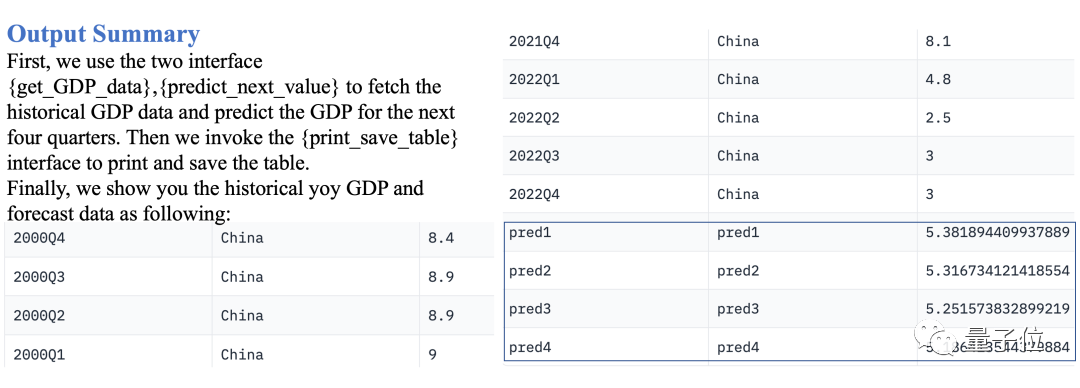 Picture
Picture
Parallel Workflow
I want to see the price-earnings ratios of CATL and Kweichow Moutai in the last three years
corresponding The workflow is:
Get stock price data→Calculate related index→Generate chart
 Picture
Picture
The related work of the two stocks is at the same time In parallel, the following chart is finally obtained:
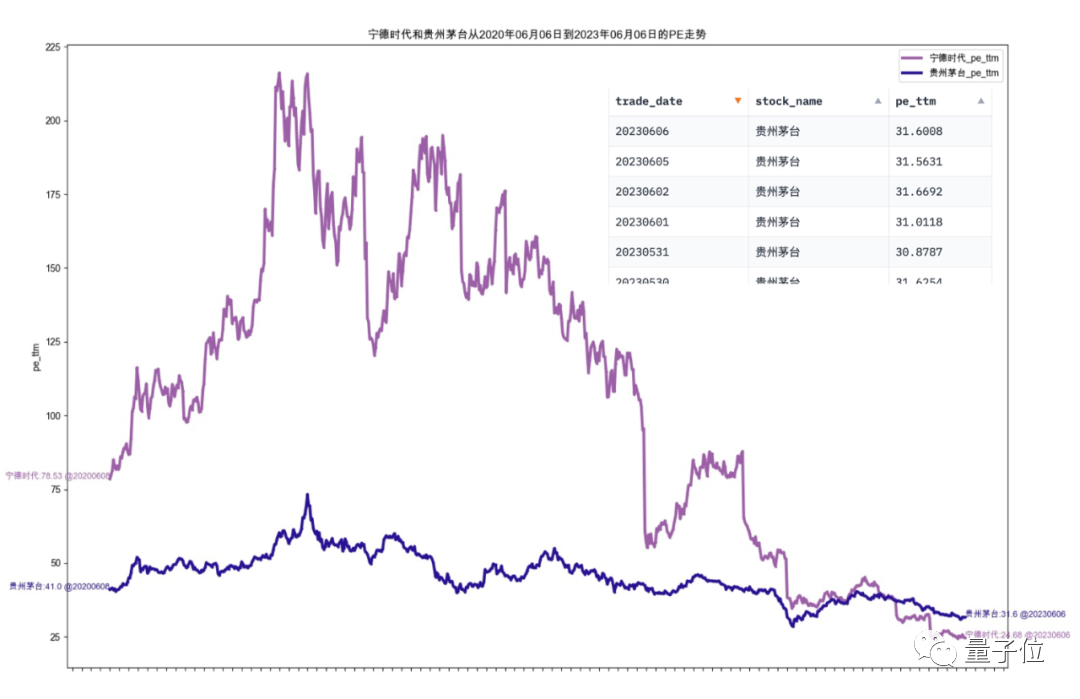 Picture
Picture
Main method
Data-Copilot is a general large language model The system has two main stages: interface design and interface scheduling.
- Interface design: The research team designed a self-request process to enable LLM to autonomously generate enough requests from a small number of seed requests. Then, LLM iteratively designs and optimizes the interface based on the generated requests. These interfaces are described using natural language, making them easy to extend and transfer between different platforms.
- Interface scheduling: After receiving user requests, LLM plans and calls interface tools based on self-designed interface descriptions and in context demonstrations, deploys a workflow that meets user needs, and presents the results in multiple forms to users.
Data-Copilot achieves highly automated data processing and visualization by automatically generating requests and independently designing interfaces to meet user needs and display results to users in multiple forms.
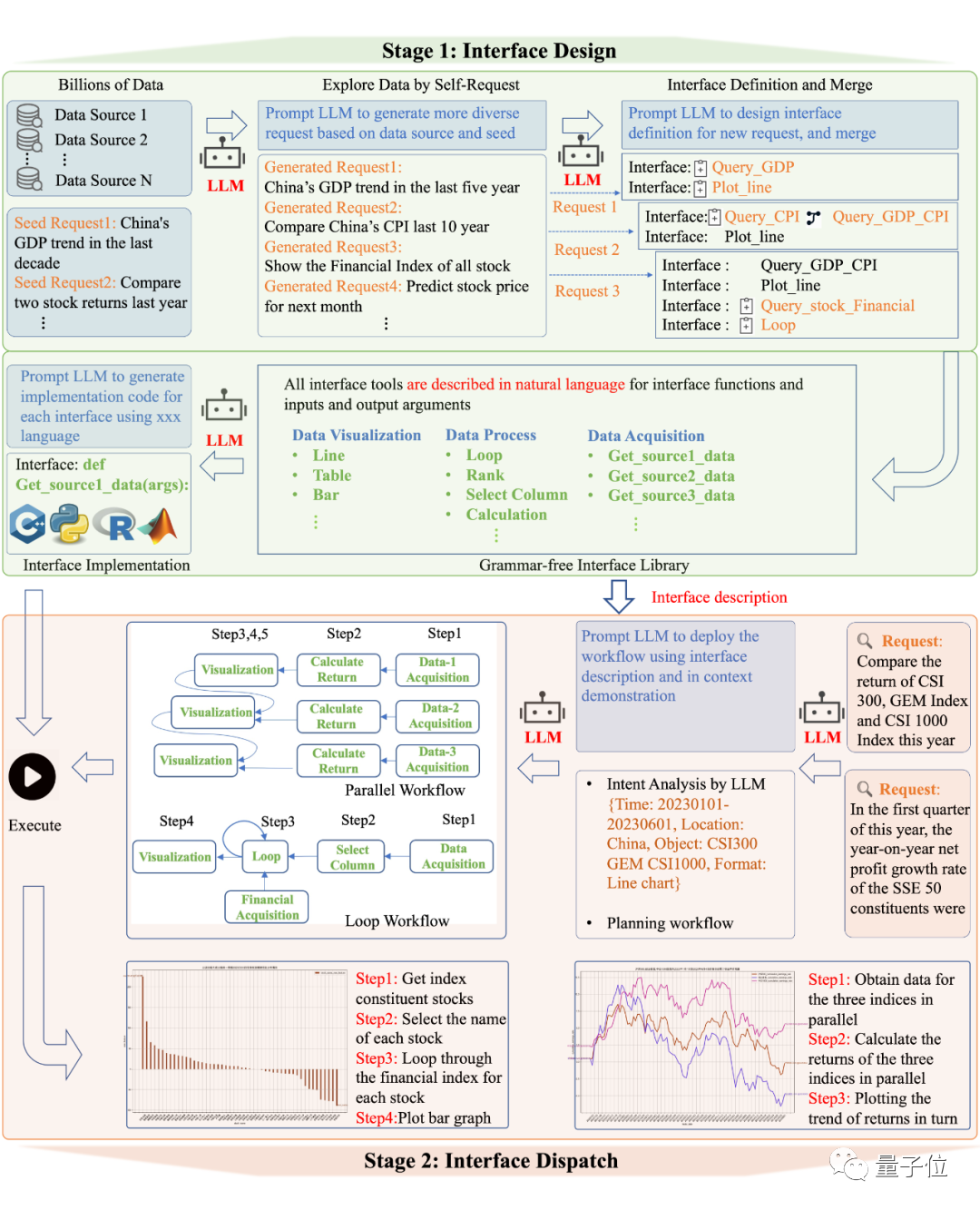 Picture
Picture
Interface design
As shown in the figure above, data management must first be implemented, and the first step requires interface tools.
Data-Copilot will design a large number of interfaces as a data management tool. The interface is a module composed of natural language (functional description) and code (implementation), which is responsible for data acquisition, processing and other tasks.
- First of all, LLM uses a small number of seed requests and independently generates a large number of requests (explore data by self-request) to cover various application scenarios as much as possible.
- Then, LLM designs corresponding interfaces for these requests (interface definition: only includes description and parameters), and gradually optimizes the interface design (interface merge) in each iteration.
- Finally, the researchers used LLM's powerful code generation capabilities to generate specific code (interface implementation) for each interface in the interface library. This process separates the design of the interface from the specific implementation, creating a versatile set of interface tools that can satisfy most requests.
As shown below: Data-Copilot’s self-designed interface tool is used for data processing
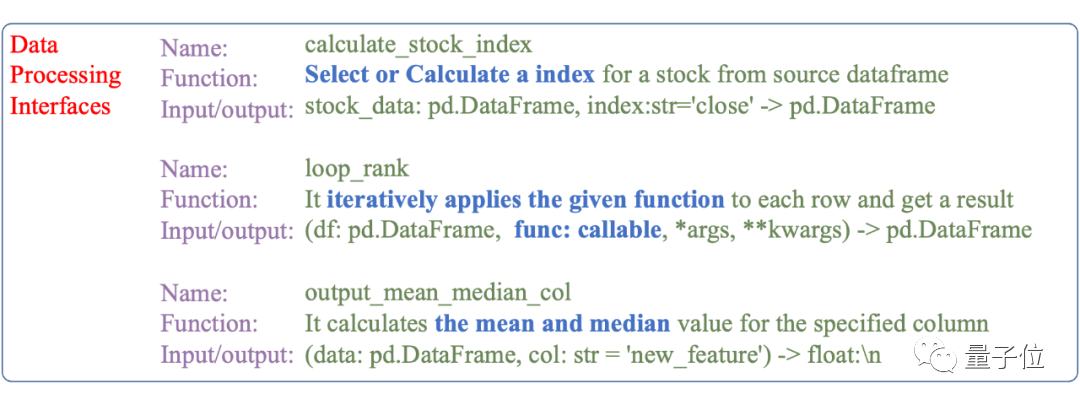 Picture
Picture
Interface Scheduling
In the previous stage, researchers obtained various common interface tools for data acquisition, processing and visualization. Each interface has a clear and explicit functional description. As shown in the figure above for the two queries, Data-Copilot forms a workflow from data to results in multiple forms through planning and calling different interfaces in real-time requests.
- Data-Copilot first performs intent analysis to accurately understand the user's request.
- Once the user's intention is accurately understood, Data-Copilot will plan a reasonable workflow to handle the user's request. Data-Copilot will generate a fixed-format JSON that represents each step of scheduling, such as step={“arg”:””, “function”:””, “output”:””,”description”:””} .
Guided by interface descriptions and examples, Data-Copilot orchestrates the scheduling of interfaces within each step, either sequentially or in parallel.
Data-Copilot significantly reduces dependence on tedious labor and expertise by integrating LLMs into every stage of data-related tasks, automatically transforming raw data into user-friendly visualizations based on user requests .
GitHub project page: https://github.com/zwq2018/Data-Copilot
Paper address: https://arxiv.org/abs /2306.07209
HuggingFace DEMO:https://huggingface.co/spaces/zwq2018/Data-Copilot
The above is the detailed content of Complete data analysis in one sentence, Zhejiang University's new large model data assistant eliminates the need for collection. For more information, please follow other related articles on the PHP Chinese website!

Hot AI Tools

Undresser.AI Undress
AI-powered app for creating realistic nude photos

AI Clothes Remover
Online AI tool for removing clothes from photos.

Undress AI Tool
Undress images for free

Clothoff.io
AI clothes remover

Video Face Swap
Swap faces in any video effortlessly with our completely free AI face swap tool!

Hot Article

Hot Tools

Notepad++7.3.1
Easy-to-use and free code editor

SublimeText3 Chinese version
Chinese version, very easy to use

Zend Studio 13.0.1
Powerful PHP integrated development environment

Dreamweaver CS6
Visual web development tools

SublimeText3 Mac version
God-level code editing software (SublimeText3)

Hot Topics
 1389
1389
 52
52
 Open source! Beyond ZoeDepth! DepthFM: Fast and accurate monocular depth estimation!
Apr 03, 2024 pm 12:04 PM
Open source! Beyond ZoeDepth! DepthFM: Fast and accurate monocular depth estimation!
Apr 03, 2024 pm 12:04 PM
0.What does this article do? We propose DepthFM: a versatile and fast state-of-the-art generative monocular depth estimation model. In addition to traditional depth estimation tasks, DepthFM also demonstrates state-of-the-art capabilities in downstream tasks such as depth inpainting. DepthFM is efficient and can synthesize depth maps within a few inference steps. Let’s read about this work together ~ 1. Paper information title: DepthFM: FastMonocularDepthEstimationwithFlowMatching Author: MingGui, JohannesS.Fischer, UlrichPrestel, PingchuanMa, Dmytr
 The world's most powerful open source MoE model is here, with Chinese capabilities comparable to GPT-4, and the price is only nearly one percent of GPT-4-Turbo
May 07, 2024 pm 04:13 PM
The world's most powerful open source MoE model is here, with Chinese capabilities comparable to GPT-4, and the price is only nearly one percent of GPT-4-Turbo
May 07, 2024 pm 04:13 PM
Imagine an artificial intelligence model that not only has the ability to surpass traditional computing, but also achieves more efficient performance at a lower cost. This is not science fiction, DeepSeek-V2[1], the world’s most powerful open source MoE model is here. DeepSeek-V2 is a powerful mixture of experts (MoE) language model with the characteristics of economical training and efficient inference. It consists of 236B parameters, 21B of which are used to activate each marker. Compared with DeepSeek67B, DeepSeek-V2 has stronger performance, while saving 42.5% of training costs, reducing KV cache by 93.3%, and increasing the maximum generation throughput to 5.76 times. DeepSeek is a company exploring general artificial intelligence
 AI subverts mathematical research! Fields Medal winner and Chinese-American mathematician led 11 top-ranked papers | Liked by Terence Tao
Apr 09, 2024 am 11:52 AM
AI subverts mathematical research! Fields Medal winner and Chinese-American mathematician led 11 top-ranked papers | Liked by Terence Tao
Apr 09, 2024 am 11:52 AM
AI is indeed changing mathematics. Recently, Tao Zhexuan, who has been paying close attention to this issue, forwarded the latest issue of "Bulletin of the American Mathematical Society" (Bulletin of the American Mathematical Society). Focusing on the topic "Will machines change mathematics?", many mathematicians expressed their opinions. The whole process was full of sparks, hardcore and exciting. The author has a strong lineup, including Fields Medal winner Akshay Venkatesh, Chinese mathematician Zheng Lejun, NYU computer scientist Ernest Davis and many other well-known scholars in the industry. The world of AI has changed dramatically. You know, many of these articles were submitted a year ago.
 Hello, electric Atlas! Boston Dynamics robot comes back to life, 180-degree weird moves scare Musk
Apr 18, 2024 pm 07:58 PM
Hello, electric Atlas! Boston Dynamics robot comes back to life, 180-degree weird moves scare Musk
Apr 18, 2024 pm 07:58 PM
Boston Dynamics Atlas officially enters the era of electric robots! Yesterday, the hydraulic Atlas just "tearfully" withdrew from the stage of history. Today, Boston Dynamics announced that the electric Atlas is on the job. It seems that in the field of commercial humanoid robots, Boston Dynamics is determined to compete with Tesla. After the new video was released, it had already been viewed by more than one million people in just ten hours. The old people leave and new roles appear. This is a historical necessity. There is no doubt that this year is the explosive year of humanoid robots. Netizens commented: The advancement of robots has made this year's opening ceremony look like a human, and the degree of freedom is far greater than that of humans. But is this really not a horror movie? At the beginning of the video, Atlas is lying calmly on the ground, seemingly on his back. What follows is jaw-dropping
 Slow Cellular Data Internet Speeds on iPhone: Fixes
May 03, 2024 pm 09:01 PM
Slow Cellular Data Internet Speeds on iPhone: Fixes
May 03, 2024 pm 09:01 PM
Facing lag, slow mobile data connection on iPhone? Typically, the strength of cellular internet on your phone depends on several factors such as region, cellular network type, roaming type, etc. There are some things you can do to get a faster, more reliable cellular Internet connection. Fix 1 – Force Restart iPhone Sometimes, force restarting your device just resets a lot of things, including the cellular connection. Step 1 – Just press the volume up key once and release. Next, press the Volume Down key and release it again. Step 2 – The next part of the process is to hold the button on the right side. Let the iPhone finish restarting. Enable cellular data and check network speed. Check again Fix 2 – Change data mode While 5G offers better network speeds, it works better when the signal is weaker
 KAN, which replaces MLP, has been extended to convolution by open source projects
Jun 01, 2024 pm 10:03 PM
KAN, which replaces MLP, has been extended to convolution by open source projects
Jun 01, 2024 pm 10:03 PM
Earlier this month, researchers from MIT and other institutions proposed a very promising alternative to MLP - KAN. KAN outperforms MLP in terms of accuracy and interpretability. And it can outperform MLP running with a larger number of parameters with a very small number of parameters. For example, the authors stated that they used KAN to reproduce DeepMind's results with a smaller network and a higher degree of automation. Specifically, DeepMind's MLP has about 300,000 parameters, while KAN only has about 200 parameters. KAN has a strong mathematical foundation like MLP. MLP is based on the universal approximation theorem, while KAN is based on the Kolmogorov-Arnold representation theorem. As shown in the figure below, KAN has
 The vitality of super intelligence awakens! But with the arrival of self-updating AI, mothers no longer have to worry about data bottlenecks
Apr 29, 2024 pm 06:55 PM
The vitality of super intelligence awakens! But with the arrival of self-updating AI, mothers no longer have to worry about data bottlenecks
Apr 29, 2024 pm 06:55 PM
I cry to death. The world is madly building big models. The data on the Internet is not enough. It is not enough at all. The training model looks like "The Hunger Games", and AI researchers around the world are worrying about how to feed these data voracious eaters. This problem is particularly prominent in multi-modal tasks. At a time when nothing could be done, a start-up team from the Department of Renmin University of China used its own new model to become the first in China to make "model-generated data feed itself" a reality. Moreover, it is a two-pronged approach on the understanding side and the generation side. Both sides can generate high-quality, multi-modal new data and provide data feedback to the model itself. What is a model? Awaker 1.0, a large multi-modal model that just appeared on the Zhongguancun Forum. Who is the team? Sophon engine. Founded by Gao Yizhao, a doctoral student at Renmin University’s Hillhouse School of Artificial Intelligence.
 FisheyeDetNet: the first target detection algorithm based on fisheye camera
Apr 26, 2024 am 11:37 AM
FisheyeDetNet: the first target detection algorithm based on fisheye camera
Apr 26, 2024 am 11:37 AM
Target detection is a relatively mature problem in autonomous driving systems, among which pedestrian detection is one of the earliest algorithms to be deployed. Very comprehensive research has been carried out in most papers. However, distance perception using fisheye cameras for surround view is relatively less studied. Due to large radial distortion, standard bounding box representation is difficult to implement in fisheye cameras. To alleviate the above description, we explore extended bounding box, ellipse, and general polygon designs into polar/angular representations and define an instance segmentation mIOU metric to analyze these representations. The proposed model fisheyeDetNet with polygonal shape outperforms other models and simultaneously achieves 49.5% mAP on the Valeo fisheye camera dataset for autonomous driving



